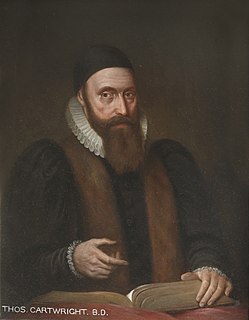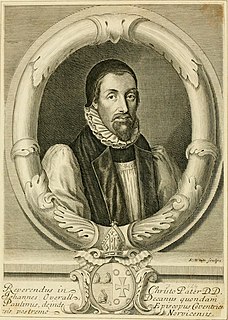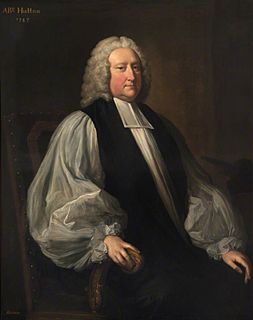Related Research Articles

The Archbishop of Canterbury is the senior bishop and principal leader of the Church of England, the symbolic head of the worldwide Anglican Communion and the diocesan bishop of the Diocese of Canterbury. The current archbishop is Justin Welby, who was enthroned at Canterbury Cathedral on 21 March 2013. Welby is the 105th in a line which goes back more than 1400 years to Augustine of Canterbury, the "Apostle to the English", sent from Rome in the year 597. Welby succeeded Rowan Williams.

Richard Bancroft was an English churchman, Archbishop of Canterbury from 1604 to 1610 and "chief overseer" of the King James Bible.

John Whitgift was the Archbishop of Canterbury from 1583 to his death. Noted for his hospitality, he was somewhat ostentatious in his habits, sometimes visiting Canterbury and other towns attended by a retinue of 800 horses. Whitgift's theological views were often controversial.

Thomas Cartwright was an English Puritan churchman.

Matthew Parker was an English bishop. He was the Archbishop of Canterbury in the Church of England from 1559 until his death in 1575. He was also an influential theologian and arguably the co-founder of a distinctive tradition of Anglican theological thought.

Charles Manners-Sutton was a bishop in the Church of England who served as Archbishop of Canterbury from 1805 to 1828.

Thomas Tenison was an English church leader, Archbishop of Canterbury from 1694 until his death. During his primacy, he crowned two British monarchs.

Tobias Matthew, was an English nobleman and bishop who was President of St John's College, Oxford from 1572 to 1576, before being appointed Vice-Chancellor of Oxford University from 1579 to 1583, and Matthew would then become Dean of Durham from 1583 to 1595. All three positions, plus others, were appointed to Matthew by Elizabeth I. Eventually, he was appointed Archbishop of York in 1606 by Elizabeth's successor, James I.

Andrew Perne, Vice-Chancellor of Cambridge University and Dean of Ely, was the son of John Perne of East Bilney, Norfolk.

John Overall (1559–1619) was the 38th bishop of the see of Norwich from 1618 until his death one year later. He had previously served as Bishop of Coventry and Lichfield, as Dean of St Paul's Cathedral from 1601, as Master of Catharine Hall from 1598, and as Regius Professor of Divinity at Cambridge University from 1596. He also served on the Court of High Commission and as a Translator of the King James Version of the Bible.

Matthew Hutton was a high churchman in the Church of England, serving as Archbishop of York (1747–1757) and Archbishop of Canterbury (1757–1758).
Robert Beaumont was Master of Trinity College Cambridge from 1561 to 1567 and twice Vice-Chancellor of the University of Cambridge. During this time, he commissioned Hans Eworth to copy the 1537 Hans Holbein portrait of King Henry VIII. This copy was bequeathed to Trinity College where it hangs to this day.
The Lambeth Articles were a series of nine doctrinal statements drawn up by Archbishop of Canterbury John Whitgift in 1595 in order to define Calvinist doctrine with regard to predestination and justification.

John Jackson was a British divine and a Church of England bishop for 32 years.
Peter Baro (1534–1599) was a French Huguenot minister, ordained by John Calvin, but later in England a critic of some Calvinist theological positions. His views in relation to the Lambeth Articles cost him his position as Lady Margaret's Professor of Divinity at the University of Cambridge. He was a forerunner of views, to be called Arminian or Laudian, more common a generation later in England.

John Boys (1571–1625) was Dean of Canterbury from 1619 to 1625.

William Whitaker was a prominent Protestant Calvinistic Anglican churchman, academic, and theologian. He was Master of St. John's College, Cambridge, and a leading divine in the university in the latter half of the sixteenth century. His uncle was Alexander Nowell, the Dean of St. Paul's Cathedral and catechist.
Robert Some (Soame) (1542–1609) was an English churchman and academic. Master of Peterhouse, Cambridge from 1589, Some played a prominent part in the ecclesiastical controversies of his time, taking a middle course, hostile alike to extreme Puritans and Anglicans.
Richard Howland (1540–1600) was an English churchman and academic, Master of Magdalene College, Cambridge, and of St John's College, Cambridge, and bishop of Peterborough.
Giles Wigginton was an English clergyman who became a fringe religious activist towards the end of the sixteenth century.
References
- Attribution
-
 This article incorporates text from a publication now in the public domain : Buckland, Augustus Robert (1885). "Barret, William (fl.1595)". In Stephen, Leslie (ed.). Dictionary of National Biography . 3. London: Smith, Elder & Co. pp. 280–281.; Endnotes:
This article incorporates text from a publication now in the public domain : Buckland, Augustus Robert (1885). "Barret, William (fl.1595)". In Stephen, Leslie (ed.). Dictionary of National Biography . 3. London: Smith, Elder & Co. pp. 280–281.; Endnotes: - Prynne's Church of England's New Antithesis to Old Arminianism, 1629, pages 12, 42, 121, 134
- Canterburies Doome, 1646, pages 164, 176
- God no Deluder, p. 29
- Fuller's History of Cambridge, 1665, p. 150
- Heylyn's Hist. Quinqu-Articularis, 1660, part iii., xx, 69
- Hickman's Hist. Quinq-Artic. Exarticulata, 1674, p. 209
- Howell's State Trials, xxii. 712
- Strype's Life of Whitgift, 1822, ii. 277
- Annals of the Reformation, iv. 320, Cooper's Athenæ Cantab., 1861, ii. 236.